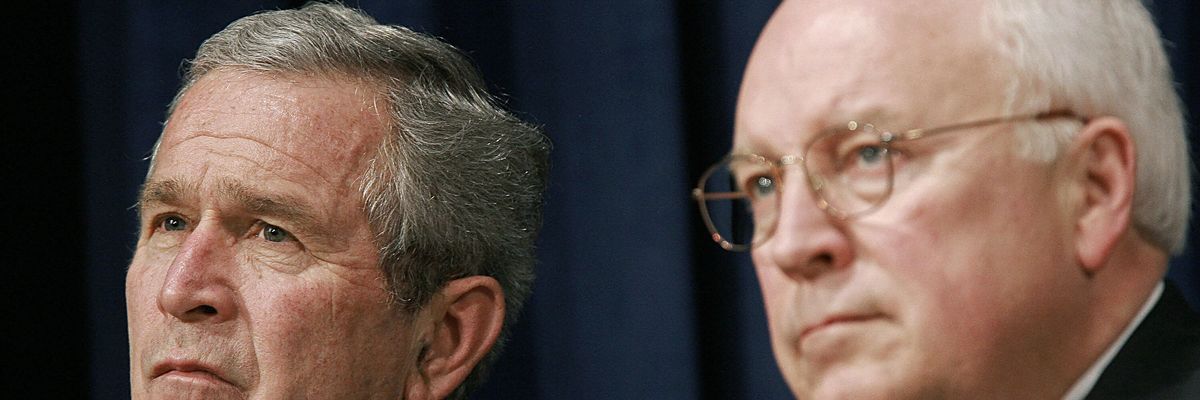The U.S. Senate repealing the 2002 Authorization for Military Force in Iraq was necessary and just. Still, that action should be viewed only as a first step in a national process of reckoning with and accounting for the consequences of the 2003 invasion and occupation of Iraq.
Often identified as the worst foreign policy decision in United States history, the Iraq War was catastrophic for millions of Americans and Iraqis and cataclysmic for Iraqi society, regional stability and international law. The invasion and occupation are correctly acknowledged as a crime: a war commissioned on lies and a violation of the Nuremberg Principles. As men and women in military or federal government service at the time of the invasion, we’re compelled to remind others of the devastation this war has wrought to ensure that the US does not re-commit this sin.
The costs of the Iraq War are staggering. As veterans we know this all too well. Over 4,500 US servicemembers were killed and more than 30,000 wounded. At least 3,600 contractors lost their lives, all men and women who would have been wearing military uniforms in previous wars. Hundreds of thousands of veterans returned from Iraq and Afghanistan (for those who fought the war it is difficult to untie the two, as so many of us participated in both) physically and mentally destroyed. Suicide, as in all wars, looms large. Limited data by the Veterans Administration states that the suicide rates for Iraq veterans are four to 10 times higher than that of their civilian peers. This grim figure supports the age-old adage that only the dead have seen the end of war.
In the U.S., many Iraq veterans will tell you that they know more dead from suicide now than from combat.
The horrific cost to the Iraqi people is as hard to grasp as it is shameful to face. Credible estimates of the number of Iraqis killed since 2003 total one million. There is no known number of wounded; it must also total in the millions. The psychological scars run deep: More than half of the Iraqi population is believed to be living with PTSD and depression, while in 2021, nearly one in four Iraqis were refugees. For those of us who were there, these are some of the hardest memories to face.
As members of the military, our expectations of entering Iraq to help the people, or at least doing them no harm, as promised in the thankfully discredited doctrine of Counter Insurgency, were replaced with the visceral understanding that we were nothing more than agents of the war’s immoral and catastrophic provenance. While our experiences of the Iraq War vary, when taken together, the joint agreement that our willingness to serve our country was being used to conduct such unaccounted for and unjust harm to the Iraqi people defines our shared sense of betrayal.
A sentiment shared widely, as almost two-thirds of Iraq veterans believe the war was not worth fighting.
The signatories of this letter do not all share political or economic philosophies, but we are united in our astonishment at this war’s massive price tag. Invading Iraq cost the US $2 trillion directly. That’s nearly $9,000 for each taxpayer in the US. However, the Iraq War cannot be divorced from the Afghan War, the larger Global War on Terror or this century's militarism, which has seen Pentagon spending balloon from $331 billion in 2001 to $858 billion today. Including future veterans' care and interest payments, the long-term cost of these conflicts will total $8 trillion by 2050.
Dozens still perish every month in militant violence in Iraq in a seemingly unending war. VA hospitals in the US strain to keep up with a generation of shattered veterans. The war succeeded only in traumatizing millions; creating terror groups where there had been none; and instigating chaos and continual hostilities, while providing hundreds of billions of dollars to weapons manufacturers.
The Iraq War was based on lies that have brought unimaginable suffering to an entire nation and ongoing loss, grief and hardship to hundreds of thousands of American families. It was and is a great crime. And in our view, as men and women who participated in the war in one way or another, the greatest crime of all may be our nation’s inability to hold accountable those responsible for authorizing such atrocities and continuing to watch our government repeat its wars over and over again.
Repealing the AUMF recognizes the error of the war, but to acknowledge its true nature, we must go further. As veterans and former national security officials we call for criminal investigations of the authors of the Iraq War as the next steps in a national reckoning.




